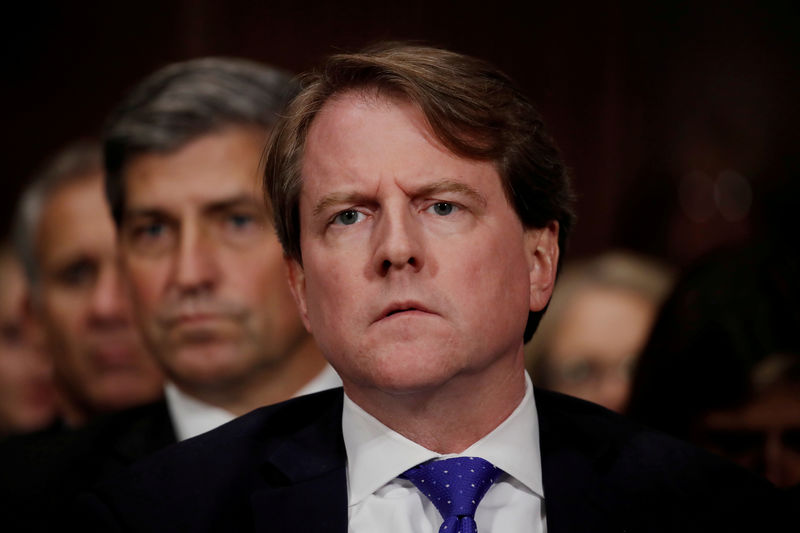By Lawrence Hurley
WASHINGTON (Reuters) - Justice Department lawyers asked a U.S. judge on Tuesday to put on hold a ruling requiring former White House Counsel Don McGahn to testify to lawmakers as part of the Democratic-led impeachment inquiry against President Donald Trump.
U.S. District Judge Ketanji Brown Jackson on Monday rejected the Trump administration's claim of broad immunity protecting current and former senior White House officials from being compelled to testify before Congress, saying no one is above the law.
The administration's court filing on Tuesday asked the judge to put her Monday ruling on hold while the Trump administration appeals it to a higher court. The White House has directed current and former officials not to testify or provide documents sought in the House of Representatives impeachment inquiry.
House Democratic leaders have focused their impeachment inquiry on Trump's actions concerning Ukraine, but have discussed pursuing a broader count of obstruction of Congress among any articles of impeachment - formal charges - brought against him. McGahn's testimony could bolster that part of their inquiry.
McGahn, who left his post in October 2018, last May defied a House Judiciary Committee subpoena to testify about Trump's efforts to impede former Special Counsel Robert Mueller's investigation that detailed Russian interference in the 2016 U.S. election. The House in September opened an impeachment inquiry focusing on the Republican president asking Ukraine to investigate domestic political adversaries.
Committee lawyers said in a court filing last week that the need for McGahn's testimony has became "even more pressing" because its investigation of Mueller's findings fall within the scope of the impeachment probe laid out in a House resolution approved in October.
"As part of the House's impeachment inquiry, the committee is continuing to investigate instances of misconduct recounted in the Mueller Report, including episodes in which McGahn was involved," the lawyers wrote.
"Given that the House's impeachment inquiry is proceeding rapidly, the committee has a finite window of time to effectively obtain and consider McGahn's testimony," they added.
McGahn told Mueller's team that Trump repeatedly directed him to have the special counsel removed and then asked him to deny having been so instructed when word of the action emerged in news reports. McGahn did not follow Trump's instructions.
Trump, writing on Twitter on Tuesday, said he would "love" to let top administration officials testify in the impeachment inquiry, but added, "It is a Democrat Scam that is going nowhere but, future Presidents should in no way be compromised."
The Justice Department, representing McGahn in his former official capacity, said in its court filing that the committee agreed to a seven-day delay in enforcing the subpoena. If the judge does not immediately impose that delay, the department said it would file an emergency application on Wednesday at the U.S. Court of Appeals for the District of Columbia Circuit.
The department said the judge's ruling was only the second in U.S. history requiring a senior presidential adviser to testify before Congress and that the dispute raises "significant and difficult separation-of-powers questions." Separation of powers refers to the U.S. Constitution assigning different authority to the federal government's executive, legislative and judicial branches.
Charles Cooper, a lawyer for Trump's former national security adviser John Bolton, indicated that Monday's ruling would not pave the way for Bolton or Bolton's former aide Charles Kupperman to testify in the impeachment probe.
Bolton has joined a separate lawsuit filed by Kupperman seeking a ruling on whether they must comply with a House subpoena. Cooper represents Kupperman and Bolton.

Cooper said Kupperman's lawsuit will move forward, noting that the McGahn subpoena did not concern national security or foreign affairs.